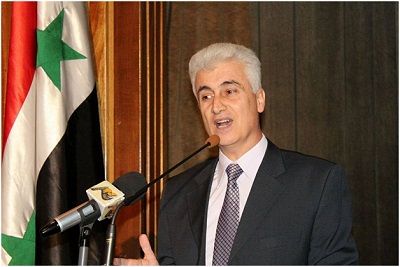Any trial to determine such a complex process as “Translation” through a definite term, is by itself a real challenge, even for any professional translator. Yet, the two-day national symposium on Translationmarking the “International Translation Day”, organized bythe Syrian Book General Commissionat Al-Assad National Library, Damascus; shed light on translation from a very sensible perspective treating translation troubles and suggesting practical solutions.
During the event opening speech, Head of the Syrian Book General Commission, Dr. ThaerZeinEddin stressed the role of translation and translators in building bridges between cultures, people throughout different periods of time in order to move forward to a prosperous future.
However, according to Haytham al-Hafez, Chairman of the Syrian Publishers Association, more attention should be paid on translating eastern civilizations cultures such as Chinese, Indian, Persian and Korean, which will enrich world literature as a whole. Whereas, Head of Translation Department at the Syrian Book General Commission, HussamKhaddour highlighted the interconnections between cultural diversity and linguistic diversity, laid emphasis on translation key role in preserving culture to enhance mankind’s knowledge.
 The participants called for setting up a legal framework for translation as a profession that maintains translators’ rights, reconsidering educational mechanisms at Syrian universities, improving curricula in order to build a well-qualified generation of translators.
The participants called for setting up a legal framework for translation as a profession that maintains translators’ rights, reconsidering educational mechanisms at Syrian universities, improving curricula in order to build a well-qualified generation of translators.
On the Symposium sideline, a book fair was held showcasing different translated books in various fields such as politics, economy, world literature, novels and short stories.
In the Terminology Lab, where not only terms but concepts as well are being produced, like “Middle East” or “ Le Monde Arabe” as an alternative replacing “ “الوطن العربي ( Al-Watan Al-Araby) which is sometimes referred to “Arab Nation” , the later as well not being a complete translation of the concept Watan (homeland) in Arabic, involving many other concepts like (belongingness, statehood, altruism, …) those deeply enrooted concepts in any citizen of Al-Watan Al-Araby mind, are so difficult to interpret in any other language. Hereinafter, relays translation process complexity not as letters or words options to replace other words but as a cultural heritage of this specific language.
 Another well-known example of a problematic translation term was “ the Golan Heights” Israeli suggested translation for “Golan” as factually referred to in Arabic, the precedent translation was used on purpose to affect on any later peace agreement between Syria and Israel. Since firstly, “Golan Heights” are only a part of a whole, and secondly “Golan Heights” do not include water sources in the Golan.
Another well-known example of a problematic translation term was “ the Golan Heights” Israeli suggested translation for “Golan” as factually referred to in Arabic, the precedent translation was used on purpose to affect on any later peace agreement between Syria and Israel. Since firstly, “Golan Heights” are only a part of a whole, and secondly “Golan Heights” do not include water sources in the Golan.
Therefore, translation in its broadest meaning, could affect very sensitive issues like the lost of a part of a homeland, and should be carefully looked at in all stages, beginning from translators qualification, to terminology industry where new concepts will be formulated and especially canned to reach very specific destinations.
Translation as an independent occupation can be traced back to the Pharaohs era, and the United Nations ranked interpretation among the first five occupations in terms of difficulty that may cause permanent damage to brain cells, since simultaneous translation involves complex and synchronized mental processes within a cycle system (hearing → Analyzing in source language → Converting to target language → articulating in target language → during hearing in the source language again)
Thusthe idea of an officially recognized International Day for Translation launched by the International Federation of Translatorsin 199, was merited to those anonymous soldiers to show solidarity of the worldwide translation community in an effort to promote the translation profession in different countries. The International Translation Day was set on the 30th of September every year, which is as wellcelebrating St. Jerome day, the Bible translator who is considered the benefactor saint of translators. Merits should be as well gifted to the Ministry of Culture for holding a symposium on translation, as well as Dr. ThaerZein al-Din, Head of the Syrian Book General Commission, for his great efforts in both practical translation and personnel affairs care of workers in the translation sector.
Lama Alhassanieh

